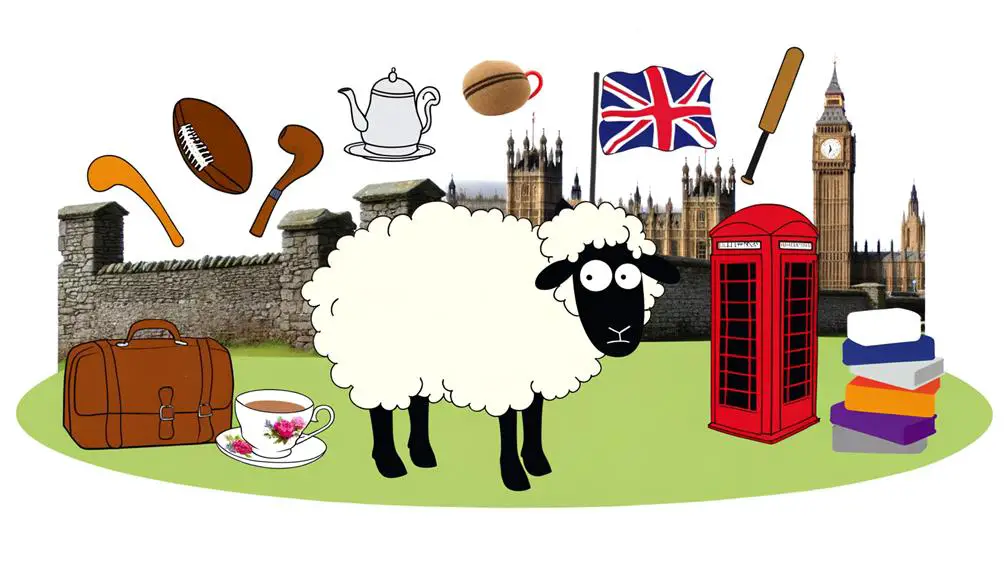In British slang, when you're called a "clot," it's not about being a lump or mass. It's a playful yet pointed way of telling you that you're acting foolishly or lacking intelligence. This term has deep roots, stretching back to Old English, but its contemporary usage reflects the linguistic adaptability and the ever-evolving nature of slang. Surprisingly, "clot" shares its space with other similar terms like "muppet" and "numpty," each carrying its unique shade of meaning. Understanding such nuances can enrich your grasp of British cultural expressions. Exploring further offers you a richer perspective on how language shapes, and is shaped by, societal norms.
Key Takeaways
- In British slang, 'clot' refers to someone considered foolish or lacking intelligence.
- The term illustrates the linguistic adaptability and cultural shifts in British slang.
- It is often used metaphorically, extending beyond its original meaning of a physical lump.
- Comparable to similar slang terms like 'muppet' or 'numpty', 'clot' carries a humorous, albeit critical, connotation.
- Understanding the context and regional variations of 'clot' is crucial, as its interpretation can vary across the UK.
The Origins of 'Clot'

Tracing the origins of 'clot' in British slang reveals its deep-rooted and evolving usage in the vernacular, illustrating how language mirrors societal attitudes and behaviors. This term's journey through time offers a fascinating glimpse into linguistic evolution, underscored by historical context. Initially, 'clot' could be traced back to Old English, where it denoted a lump or mass, often of earth or clay. Its evolution into slang, however, embodies a broader shift, highlighting the adaptability and fluidity of language in response to changing social landscapes.
As you explore further, you'll find that 'clot' began to take on more nuanced meanings within various subcultures across the UK. Each iteration carried with it reflections of the era's prevailing social dynamics, attitudes, and even humor. The term's adaptability is a reflection of the richness of linguistic evolution, showcasing how words can evolve far beyond their original definitions.
Within this historical context, 'clot' serves not just as a word but as a cultural marker, offering insights into the collective psyche and societal norms of its time. It's a prime example of how language, in its perpetual motion, captures and conveys the essence of human experience and societal evolution.
'Clot' in Modern Use
Today, 'clot' has evolved to signify more than just a physical lump, encapsulating a range of implications in contemporary British slang that reflect broader societal nuances and attitudes. The journey of 'clot' through the veins of English language – from its clot etymology to its current status in slang evolution – mirrors shifts in culture and communication. Originally denoting a mass of coagulated blood or other substance, its metamorphosis into slang speaks volumes about its linguistic elasticity and cultural penetration.
You're witnessing a term that, while rooted in the physical, now mainly serves as a metaphorical jab. It's wielded to describe someone perceived as foolish or lacking in intelligence, a reflection of the word's adaptability and the playful yet cutting nature of British slang. This evolution from a straightforward description of a physical state to a nuanced expression of social judgment underscores the dynamic nature of language and reflects changes in societal values and humor.
Understanding 'clot' in its modern usage requires appreciation for both its history and its role in the ongoing dialogue of British slang. Its journey from clot etymology to its place in slang evolution illustrates the fluidity of language, constantly shaped by and shaping the society it serves.
Variations and Similar Slang

Exploring the landscape of British slang reveals 'clot' isn't alone, with numerous variants and similar expressions painting a vivid picture of linguistic creativity and cultural context. You'll find that the richness of British slang offers a tapestry of terms that communicate nuances of foolishness, with each having its own shade of meaning, usage, and sometimes, regional affinity.
| Slang Term | Meaning | Usage Example |
|---|---|---|
| Muppet | A foolish person, often used lightly | "Stop being such a muppet and listen!" |
| Numpty | A silly or foolish person | "I can't believe I did that, what a numpty." |
| Plonker | Someone who is foolish or inept | "He's a real plonker for losing his keys." |
| Wally | An inept person, similar to a fool | "Only a real wally would forget their own birthday." |
This table not only showcases clot synonyms but also brings into focus their usage examples, helping you understand how these terms fit into everyday conversations. Each term carries a unique connotation, reflecting the precision with which English speakers in the UK express the concept of foolishness. These variations and similar slang terms embody the playful yet exact nature of British slang, enriching communication with humor and specificity.
Regional Differences
You'll find that 'clot' doesn't carry the same weight or meaning throughout the UK, as geographic usage variations have a substantial impact on its interpretation. Local interpretation nuances further complicate its usage, with some regions adopting the term more liberally or with slightly altered connotations. Understanding these regional differences is vital for grasping the full spectrum of 'clot's' meaning within British slang.
Geographic Usage Variations
The term 'clot' carries nuanced meanings across the UK, subtly shifting in connotation from one region to another. Dialect influences and cultural context shape its usage, making it a fascinating study of language evolution within the British Isles.
| Region | Connotation | Example Usage |
|---|---|---|
| Scotland | Foolish person | "Don't be such a clot!" |
| London | Mild insult | "He's a bit of a clot, isn't he?" |
| West Country | Affectionate | "You old clot, come here!" |
| Wales | Clumsy | "She's a right clot, always dropping things." |
| Northern England | Daft | "Stop acting the clot!" |
This variation highlights the rich tapestry of British regional identities, where a single word can reveal much about local attitudes and linguistic preferences.
Local Interpretation Nuances
Delving into the UK's regional nuances, it's clear that a word's meaning can dramatically shift, reflecting local dialects and cultural identities. In the context of "clot," these dialectical influences and cultural perceptions shape its interpretation across different regions. While you might find it broadly understood as a term for a foolish or clumsy person, the intensity of the insult and the situations it's applied to can vary widely. In some areas, it's a light-hearted, almost affectionate tease among friends; in others, it's a sharper critique of someone's actions or intelligence. These nuances aren't just linguistic quirks—they're a window into how language evolves within specific cultural and geographic contexts, making "clot" a multifaceted word rich in local flavor and significance.
Usage in Popular Culture

British slang's term 'clot' often surfaces in popular culture, showcasing its nuanced meanings through various media forms. The term's etymology can be traced back to Old English, initially referring to a lump or mass, which intriguingly lays the groundwork for its metaphorical leap into describing a person as thick or foolish in modern British vernacular. Its cultural impact is notable, not just within the confines of the UK, but globally, as British media continues to enjoy widespread consumption.
When you investigate its usage in popular culture, you'll find 'clot' peppered throughout:
- Television and movies: Characters in British sitcoms or films often sling 'clot' at their less-than-sharp counterparts, embedding the term further into everyday language.
- Music: British musicians sometimes incorporate 'clot' into their lyrics, using the term to critique or comment on societal norms or individual behavior.
- Literature: Authors of British origin have been known to use 'clot' to add depth to characters or to set a colloquial tone.
- Social Media: Influencers and the general public alike use 'clot' in posts and comments, spreading its usage beyond traditional media.
This exploration into 'clot's' presence in popular culture reveals not just a word's evolution, but its ability to connect and resonate across different platforms and audiences.
Understanding the Offense
Grasping why 'clot' might sting when hurled in conversation requires an understanding of its deeply embedded cultural connotations and historical baggage. This term, seemingly innocuous, carries a weight that's intertwined with social implications, demanding an level of cultural sensitivity to fully comprehend its impact. When you use 'clot' in the UK, you're not just calling someone foolish; you're invoking a rich tapestry of local dialect and the nuanced complexities of British societal norms.
The offense stems not just from the word itself but from the context in which it's used. It's a marker of in-group and out-group dynamics, subtly delineating who understands the cultural underpinnings and who stands outside them. This distinction is critical; it highlights the power of language to include or exclude, to embrace or alienate. Understanding this dynamic is key to appreciating why 'clot' can be more cutting than other, seemingly similar insults.
In essence, the term's ability to offend is directly linked to its capacity to signal a lack of awareness or disregard for the intricate layers of social etiquette and cultural heritage that define British communication. Recognizing this helps you navigate conversations with the appropriate level of sensitivity and awareness.
Tips for Non-Brits

Understanding British slang requires careful observation and an understanding of context to sidestep potential misinterpretation. You'll find that terms like 'clot' carry nuances that, if misunderstood, can lead to unintended offense or confusion. Grasping the subtleties of such expressions will greatly enhance your communication effectiveness and social interactions within the UK.
Understanding British Slang
Diving into the world of British slang requires understanding its unique expressions and idioms to fully appreciate the nuances of everyday conversation. Grasping this form of communication is not just about memorizing words; it's about immersing yourself in the language evolution and cultural context that shape these colloquialisms.
- Listen to Local Media: Engage with British TV shows, movies, and radio to hear slang in its natural habitat.
- Read British Literature and Newspapers: This exposes you to both contemporary and historical uses of slang.
- Practice with Native Speakers: Conversation helps with practical application and nuances.
- Use Online Resources: Websites and apps dedicated to slang can offer definitions and examples.
Avoiding Miscommunication
To effectively avoid miscommunication, it's vital for non-Brits to familiarize themselves with the subtleties of British slang, ensuring clear and accurate interactions. Grasping the nuanced meanings of terms like 'clot' can bridge language barriers, fostering better understanding and rapport. It's not just about learning new words but understanding the context in which they're used, as this reflects cultural sensitivity. Being aware of regional variations within the UK is also essential, as slang can differ vastly from one area to another. By actively listening and asking for clarification when unsure, you'll demonstrate respect for cultural nuances and a willingness to learn. This approach not only minimizes the risk of misinterpretation but also enriches your communication experience, making your interactions more meaningful and effective.










